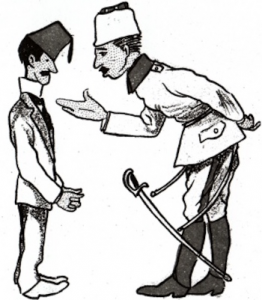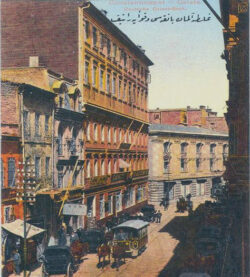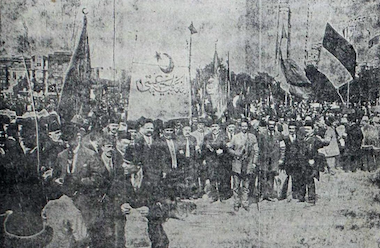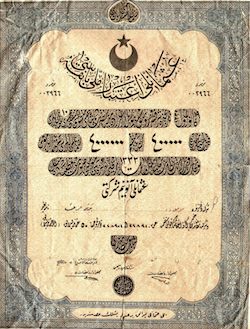The Ottoman government, unprepared for the ramifications of the conflict, faced significant economic challenges as a result of the war. The nation grappled with deficiencies in both material infrastructure and financial resources, obliging the allocation of available assets exclusively for immediate military purposes. The ensuing repercussions led to a profound transformation in the economic and social fabric of Ottoman society.

The impact on the Ottoman economic order extended beyond the direct consequences of war damage. Structural alterations, induced by the exigencies of a wartime economy, played a pivotal role in reshaping the economic landscape. The First World War marked the Ottoman Empire's initiation into the concept of total war, severing all external economic ties and thrusting the nation into a solitary struggle for survival.
In response, the Empire strategically marshaled all available resources, integrating rural areas into urban markets. The surge in demand, propelled by the necessities of the war, imparted a militarized character to the economy. Those not actively engaged in military service were compelled to perpetually make sacrifices, curtailing civilian consumption to sustain the relentless momentum of the war machine. The overarching control of the state, and specifically the military, extended dominion over both the economy and the market.
In 1914, auspicious indicators heralded the commencement of the year for the Ottoman economy. An exceptionally bountiful harvest graced the entirety of the nation, and nascent small-scale industries showed signs of burgeoning vitality. Within the international sphere, an optimistic sentiment prevailed, anticipating a luminous trajectory for the Ottoman Empire's economic fortunes. An imminent era of industrial and commercial vibrancy seemed poised to envelop the entire nation.

This optimistic landscape, however, underwent a drastic transformation with the advent of war. On 2 August 1914, the issuance of a mobilization order compelled the conscription of all able-bodied men into military service, accompanied by the requisitioning of draft animals. This abrupt and inadequately coordinated depletion of the male workforce and draft animals, constituting the backbone of the Ottoman economy in times of peace, precipitated the simultaneous collapse of both agricultural and industrial sectors. Only a partial recuperation ensued through the engagement of female labour. The military imperatives took precedence, and the consequential impact reverberated throughout the socio-economic fabric.
"We are fighting for our existence. We cannot be expected to think, at so vital a time, of secondary matters like agriculture and commerce." (Enver Pasha)
The mobilization had a profound economic impact, notably a sudden surge in the demand for cash. General requisitioning extended beyond military essentials, encompassing a wide array of commodities. Merchants, in an effort to evade requisitioning, hastily liquidated their stocks, accepting any offered price. With a surplus of sellers and a scarcity of buyers, production centers witnessed a decline in prices, while large consumption hubs, like Istanbul, experienced a notable inflationary surge.
Simultaneously, certain classes of soldiers, offered exemption from military service in exchange for a payment, intensified the demand for cash. This heightened demand precipitated a frenzied rush to banks, culminating in the eventual collapse of the banking system. The consequences were profound, as the economic repercussions of the mobilization rippled through various sectors, engendering a complex interplay of market forces.
Economic Nationalism

Amidst prevailing economic adversities, the overarching economic strategy of the government was a neglect of the present and concern for the future. The Sublime Porte exhibited a diminished preoccupation with the immediate repercussions of wartime economic challenges, directing its attention instead towards post-war measures and prospects. Simultaneously, the economic quandaries presented an opening for advocates of economic nationalism, denoting self-sufficiency founded upon industrialization as opposed to the Western paradigm of decentralization and economic liberalism.
The genesis of economic nationalism was not a nascent concept; its origins can be traced back to the 1908 revolution. Nevertheless, owing to the Ottoman Empire's entanglement in free trade treaties and Capitulations that accorded foreigners a privileged position in Ottoman commerce, proponents of economic nationalism within the government found themselves powerless to alter the policies of the Ottoman regime. In the pre-war epoch, the Ottoman economy was profoundly subject to the influence of European powers, granting foreign merchants exemption from specific taxes, diplomatic protection, and immunity from Ottoman court jurisdiction.
Moreover, the Ottoman government found itself constrained, unable to modify its uniform customs tariff without acquiescence from European powers. The pre-existing international agreements and the privileges conferred upon foreign entities severely compromised the sovereignty of the Ottoman Empire, impeding any substantive shifts in economic policies by those sympathetic to the cause of economic nationalism.
The outbreak of the war gave economic nationalism the opportunity it needed. Leveraging the latitude afforded by the war, the government capitalised on its operational autonomy to rectify historical economic injustices. The guiding objective of the governmental economic agenda centred on attaining complete economic autonomy, "Turkifying" the business sector, and harnessing the nation's economic assets. Although Western capital and expertise were not outright dismissed, their integration necessitated collaboration with Turkish labour, entrepreneurship, and capital.
However, the well-intentioned and ostensibly sound nature of this policy confronted challenges. The prevailing conditions in the country were not sufficiently mature for the effective implementation of such a directive. Notably, the exigencies of the immediate wartime period compelled sacrifices of short-term imperatives in favour of protracted development strategies.
Abolishment of the Capitulations

The initial substantive measure undertaken marked the termination of the Capitulations. Legislation addressing the status of foreigners within the Ottoman Empire rescinded all concessions and privileges afforded to foreign merchants. Furthermore, on 3 March 1916, the ad valorem customs tariff was annulled and supplanted by a differentiated tariff, grounded in the principle of safeguarding domestic industries, encompassing agriculture, food, cement, and textiles. Imports of agricultural implements and other forms of production machinery were exempted from duties. Moreover, the government declared a moratorium on payments on external debt, most of which was held by citizens of France, Germany and Britain.
The abrogation of pre-war privileges extended to foreigners constituted merely the inaugural phase of a forceful economic nationalism that evolved during the war. The impetus behind this initiative was twofold: dismantling the influence wielded by foreign powers over the national economy and assuming control of sectors hitherto monopolized by non-Muslims. The mass exodus of non-Muslim populations during the conflict engendered a considerable scarcity of skilled labour, compelling the imperative establishment of a Turkish business class. Concurrently, measures were implemented during the war, including incentivizing public utility companies with foreign capital to reorganize legally as Turkish entities, instituting policies to promote Turkish employment, and affording young Turks increased opportunities and training, thereby equipping them for prospective careers in business.

In pursuit of its national economic objectives during the war, the government implemented several tangible initiatives. Foremost among these was the establishment of the Bank of National Credit (Crédit National Ottoman; İtibar-ı Milli Bankası) in 1917. Simultaneously, the Agricultural Bank (Ziraat Bankası) underwent reorganization, and the expertise of foreign economic advisors was enlisted. The creation of the Office of War Industry (Harp Sanayi Ofisi) was mandated across all provinces. The standardization of the national currency was effectuated through a specific legislative enactment known as the Tevhid-i Meskukat Kanunu. Furthermore, the existing Law for Encouraging Industry (Teşvik-i Sanayi Kanunu), originally instituted in 1909, was extended, presenting a revised version that stipulated Ottoman citizenship as a requisite for all factory employees and labourers, excluding technical experts. Governmental support was assured for each new factory, and gradual exclusion of foreign entities from law-granted privileges was articulated.
Though the government's measures exerted a positive influence on domestic industry, the simultaneous dearth of manpower and raw materials posed formidable constraints on the potential for industrial expansion. The exigencies of war depleted the Empire's resources, leaving scant support for industrial sectors. The Ottoman gross national product witnessed a decline ranging between 30 to 40 percent during the war. Only in the latter part of the 1930s did Turkey's per capita income regain its pre-war levels, and the restoration of real wages did not materialise until the 1950s. It is imperative to underscore that the economic policies of the Ottoman government during the war substantially shaped the economic ideology of the emergent nation-state, Turkey. This influence persisted, with self-sufficiency and economic nationalism maintaining preeminent status in national priorities until at least the conclusion of the Second World War.
![]()
Sources consulted:
- Akyıldız, A., “Para Pul Oldu: Osmanlı’da Kağıt Para, Maliye ve Toplum” (Paper Money, Public Finance and Society in the Ottomans), İletişim Yayınları, Istanbul, 2003.
- Eldem, E., "A History of the Ottoman Bank", Ottoman Bank Historical Research Cente, Istanbul, 1999.
- Elmacı, M.E., “İttihat Terakki ve Kapitülasyonlar” (Committee of Union and Progress and the Capitulations), Homer Kitabevi, Istanbul, 2005.
- Esin, T., "Osmanlı Savaşı'nın İktisadî Aktörleri 1914-19" (The Economic Actors of the Ottoman War 1914-19), Tarih Vakfı Yurt Yayınları, Istanbul, 2020.
- Geyikdağı, V.N., “Osmanlı Devleti’nde Yabancı Sermaye 1854-1914” (Foreign Investment in the Ottoman Empire 1854-1914), Hil Yayın, Istanbul, 2008.
- Issawi, C., "The Economic History of Turkey, 1800-1914", University of Chicago Press, Chicago, 1980.
- Pamuk, Ş., “Osmanlı Ekonomisinde Bağımlılık ve Büyüme 1820-1913” (Dependence and Growth of the Ottoman Economy 1820-1913), Tarih Vakfı Yurt Yayınları, Istanbul, 1994 (first published in Ankara, 1984)
- Toprak, Z., “İttihad-Terakki ve Cihan Harbi: Savaş Ekonomisi ve Türkiye’de Devletçilik 1914-1918” (Committee of Union and Progress and the World War: War Economy and Etatism in Turkey 1914-1918), Homer Kitabevi, Istanbul, 2003.
- Yorulmaz, N., “Büyük Savaşın Kara Kutusu: 2. Abdülhamid’den 1. Dünya Savaşı’na Osmanlı Silah Pazarının Perde Arkası” (The Black Box of the Great War: Behind the Scenes of the Ottoman Arms Market from Abdulhamid to the First World War), Kronik Kitap, Istanbul, 2018.
PAGE LAST UPDATED ON 30 DECEMBER 2023